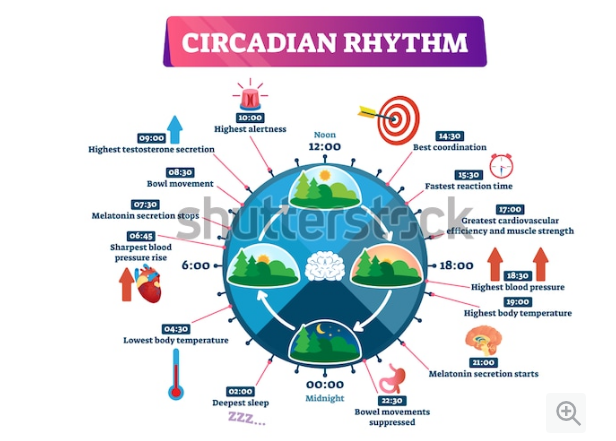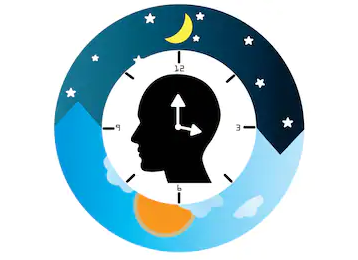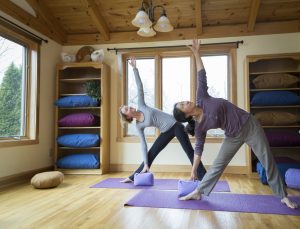Winter is a great time to get some extra beauty sleep. With the longer nights and cold temperatures, our bodies are designed to slow down and regenerate. Sleep and meditation compliment each other. Meditation helps us slow down so we can relax and experience deeper sleep, and sleep helps our meditation by optimizing our ability to focus and thus reach that magical silent peace of deep alpha and theta brain waves.
How well balanced are your circadian rhythms? Meaning, do you sleep deeply and wake up refreshed? Is your metabolism working? Body weight at a good level? Most likely not. Because the modern lifestyle has thrown off the basics of circadian biology.

Here are some tips that help you balance your Circadian Rhythms and improve your sleep and meditation.
1–Eat a pro-thyroid diet, which means a diet native to the climate you live in. This includes high quality fat and protein and less carbs during winter. The reason is this regulates blood sugar and makes your body generate the heat it needs to stay warm. According to Dr. Lita Lee, chronic insomnia or lack of quality sleep is one symptom of a major health condition called hypothyroidism which leads to all the major degenerative diseases and aging. By understanding this problem, one can reverse the aging process, restore quality sleep, and get off of sleep medications.
2–Turn down the heat in your house, especially during sleep. Studies show we sleep best at lower temperatures. Also, expose yourself to outside air regularly. This practice, also called Cold Thermogenesis, has proven to enhance sleep quality dramatically. In other words, cold exposure has a dramatic calming effect on the body. Cold exposure is also part of the equation of synchronizing our circadian rhythms.
3–Get natural sunlight every day…at least 20 minutes. But an hour or more is even better. For many of us we need to be creative to incorporate this into our busy lives with the short daylight hours of winter. This sunlight exposure on the skin and retina causes the body to produce more serotonin which converts into melatonin when it gets dark. Make sure you have no glasses or sunglasses when trying to get the maximum sun (these block the beneficial rays which set circadian rhythms). The most effective time is first thing in the morning at sunrise. Another option is during lunchtime. So try to plan your day around your needs for these essential and powerful nutrients. Take a break as often as you can and get outside with as much skin exposed as possible.
4–Low Lights. Artificial light (meaning flouescent, incadescent, ) causes under production of melatonin which makes it harder to fall asleep as well as hampers sleep quality. Use Blue Blocking Goggles or Amber Colored light bulbs three hours before you want to fall asleep. Another option is beeswax candles.
Your body produces the important hormone melatonin, the so-called sleep hormone. Increasing your body’s melatonin production can improve your sleep.
Melatonin is produced by your pineal gland, normally only when you are in darkness. Using artificial light in the evening before going to bed shuts down melatonin production. Blue rays in ordinary light are the problem.
Only the blue component of light shuts down melatonin production. Using Blue Blocking Glasses for one to three hours before retiring allows melatonin to be produced naturally. While using them, the remaining colors of light allow you to read, watch television, etc.

5–Avoid exposure to Electromagnetic Fields (EMF’s) as much as possible. Especially during sleep. Turn your bedroom into a sanctuary from EMF’s as well as toxic chemicals. There are many ways to mitigate EMF exposure but some of the simple things you can do are to turn the circuits off in your bedroom at night, ground your computer during the day, and create a Faraday Cage by various means, such as painting shielding paint in your bedroom, creating a bed canopy with EMF Shielding Fabric, or putting metal siding and roofing around your house.
6–Optimal Circadian Timing of daily activities:
a–Go to bed early. This means at least by 10pm but even earlier if you can. The trick is…you don’t need to force anything. You should be so tired that sleep just happens naturally. The way to get to this point is to follow these principles.
b–Wake up with the sun. Ideally don’t set an alarm but let your body get whatever rest it needs. When you can greet the sunrise outside with exposure to cold and light on the retina. You can have your breakfast on the porch or yard. Morning sun is extremely important because it tells your brain to get moving.
c-Make breakfast the big meal of the day. The digestive juices are the most abundant during that time, which is about 30 minutes after waking up. Include lots of fats, proteins to fuel your metabolism throughout the day and keep blood sugar even.
d–Get movement during the day. Our DNA is programmed for movement…meaning it is an essential NUTRIENT. This recent discovery has birthed the new Movement Culture and books like “Sitting Kills, Movement Heals”, by NASA Scientist Dr. Vernikos. Create a movement friendly office environment and get some walking or other fun activities in. Play in the snow!

